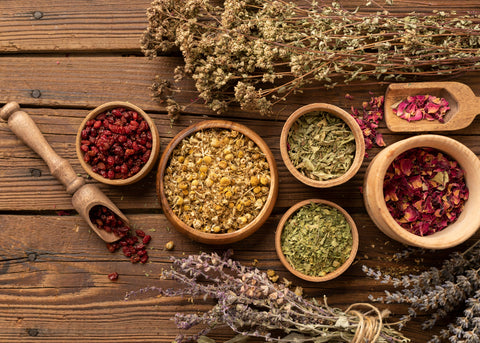What is Brahmi?
The word “Brahmi” has been used to describe two distinct Ayurvedic herbs—Centella asiatica and Bacopa monnieri. In Indian mythology brahmi is a Sanskrit word that refers to the feminine essence of universal consciousness. In Ayurveda, both of the herbs that bear the name brahmi are thought to promote subtle awareness and sattva (the pure essence of consciousness).
They are also both highly revered for their mind-enhancing properties and their support on the nervous system. The dual use of the name brahmi is a result of geographical differences. In southern India, “brahmi” refers to Bacopa monnieri, and in Northern India, Centella asiatica is commonly known as “brahmi.” In the west, Centella asiatica is also widely known by its name Gotu Kola.

Pharmacological actions of Brahmi (Bacopa monnieri)
Table 1. Active constituents of Brahmi (Bacopa monnieri)

Saponins are the main active constituents of Bacopa monnieri responsible for most of its pharmacological actions, which are known to be antioxidant, anti-inflammatory, anticonvulsant, cardio protective, neuro-protective and adaptogenic. Regarding its uses in Ayurvedic medicine, Brahmi is known to improve memory by decreasing forgetfulness, improve insomnia, and reduce anxiety.
Antioxidant Effect
Oxidative stress is one of the most important factors in aging and age-related illnesses and is defined as imbalance between free radicals and antioxidants. The most common radicals known to contribute to oxidative stress are hydroxyl (OH’), hydrogen peroxide (H2O2), peroxynitrite (ONO2 –), and superoxide free radical (O2 –). Free radicals are unstable and highly reactive due to presence of an unpaired electron in their atomic orbital. They can either donate an electron to or accept an electron from other molecules, therefore behaving as oxidants or reductants. Due to their unstable nature they can cause damage to DNA and proteins, lipid peroxidation and cell apoptosis. Antioxidants, on the other hand, donate electrons to free radicals, which neutralises them and prevents them from causing harm (Figure 1).

Figure 1. Antioxidant and Free radical
Many in vitro studies have shown that brahmi has an antioxidant and free radical scavenging action. This action of brahmi is mostly predominant in the brain. Recent studies have shown an ability of brahmi to inhibit lipid peroxidation in the prefrontal cortex, hippocampus, and striatum (Simpson et al., 2015). Another study done by Anand et al. (2011) confirmed the same by demonstrating an ability of brahmi to act as a potent natural anti-oxidant and DNA damage preventing agent.
Anti-Inflammatory Effect
The anti-inflammatory effect of brahmi is due to the triterpenoid and bacoside present in the plant. Brahmi has the ability to inhibit inflammation through modulation of pro-inflammatory mediator release such as tumour necrosis factor-alpha and interleukin-6. A study done by Jain et al. (1994) suggested that brahmi can partially mediate anti-inflammatory activity by interfering with the action and/or synthesis of prostaglandins and by stabilisation of the lysosomal membranes. Jain et al. further suggested that the anti-inflammatory activity of brahmi is comparable to that of indomethacin.
Cardioprotective Effect
Brahmi is known for its positive effect on the cardiovascular system. In a study done by Srimachai et al. (2017) brahmi induced a concentration-dependent improvement in coronary flow, promoted cardiac function, and reduced infarct area resulting from ischemia and reperfusion in isolated perfused hearts. In the same study brahmi was shown to act directly on vascular smooth muscle cells by inhibiting extracellular Ca2+ influx and Ca2+ release from sarcoplasmic reticulum (Srimachai et al., 2017). In another study done by Amnart et al. (2012), brahmi demonstrated a concentration dependant reduction in blood pressure without affecting the heart rate; which suggested her effect on peripheral vasodilation caused by inhibition of the L-type Ca2+ channel.
Adaptogen Effect
Brahmi also acts as a powerful adaptogen and it has a positive effect on stress management. This effect is reflected in its ability to act on two important P450 enzymes, PROD and EROD which help the body deal with stress. Brahmi is also known to reduce stress markers in the hippocampus area balances certain neurotransmitter levels in the brain. Recent study has also suggested that Brahmi can reduce the levels of cortisol, the stress inducing hormone (Srimachai et al., 2017).
Neuro-Protective and Cognitive Effect
Brahmi interacts with the dopamine and serotonergic systems, but its main mechanism concerns promoting neuron communication. It does this by enhancing the rate at which the nervous system can communicate by increasing the growth of nerve endings, also called dendrites. Brahmi extract may be able to increase memory by acting on the enzyme Tryptophan Hydroxylase (TPH2) and increasing the expression of the serotonin transporter (SERT).
Brahmi, in healthy persons, has been successful in affecting the retention of learned information, where it was able to reduce the rate of short term forgetting while increasing retention speeds. In addition to rate of learning, brahmi was also shown successful in improving memory, verbal learning and delayed recall (Morgan & Stevens, 2010).
References
-
Amnart, O. et al. (2012). Oral Bacopa monnieri is Antihypertensive in Rats Chronically Treated with L-NAME. Journal of Physiological and Biomedical Sciences. 25(1), 23-26.
-
Anand, T., Mahadeva, N. et al. (2011). Antioxidant and DNA Damage Preventive Properties Of Bacopa Monniera. Free Radicals and Antioxidants. 1(1), 84-90.
-
Morgan, A., Stevens, J. (2010). Does Bacopa monnieri improve memory performance in older persons? Results of a randomized, placebo-controlled, double-blind trial. Journal of Alternative and Complementary Medicine. 16(7), 753-759.
-
Simpson, T., Pase, M., Stough, C. (2015). Bacopa monnieri as an antioxidant therapy to reduce oxidative stress in the aging brain. Evidence Based Complementary Alternative Medicine. 2(10), 10-15.
-
Srimachai, S., Devaux, S. et al. (2017). Bacopa monnieri extract increases rat coronary flow and protects against myocardial ischemia/reperfusion injury. BMC Complementary and Alternative Medicine. 2(17), 17-25.
-
Jain, P., Khanna, N.K., Trehan, N. et al. (1994). Anti-inflammatory effects of an Ayurvedic preparation, Brahmi Rasayan, in rodents. Indian Journal of Experimental Biology. 32(9), 633-666.
-
Image credits: Image by Freepik
Any information or product suggested on this website is not intended to diagnose, treat, cure or prevent any medical condition. Never disregard medical advice or delay in seeking it because of something you have read on this website. Consult your primary healthcare physician before using any supplements or making any changes to your regime.




